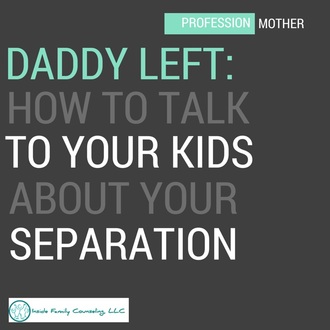
Don't worry, you are not alone! By the end of this post, I hope that you will feel supported, encouraged and confident in your ability to address the issue with your kids in an informed and psychologically-minded way.
Tip #1. Remember, children are very sensitive.
Children are very sensitive to their parents' emotional state and will detect that something is wrong, especially if one day dad was there and the next day, he isn't. Usually, they don't know how to verbalize what they may be feeling but you may notice it through their behavior - maybe they appear sad, refuse to eat, struggle to sleep or seem to be acting angry and throw more tantrums than usual. Any unusual or different behavior may be an indication and/or a communication to you that they feel something is not quite right with their mommy or daddy.
Tip #2. Tell the truth about the separation even if it hurts.
Tip #3. Talk about yours and your children's feelings.
Putting yours and your children's feelings into words is a great way to begin modeling for them how to express their feelings in a healthy way and how to be comfortable with both positive and negative emotions. This validates their experience and creates a facilitating environment for them to understand and cope with their feelings: "It really hurts that daddy left and it is okay to be sad. Mommy is sad too."
Tip #4. Speak to your kids about their dad in a positive light.
Even if their dad is not longer around and maybe did something hurtful to you or the kids, it is important that you share his positive aspects with your kids as well: "Your daddy really loved you and wanted you; He would be so proud of you if he was here." Bad mouthing dad is probably the worst thing you can do for your children - they deserve to have a “good mommy” and a “good daddy” despite what went wrong between the two of you.
Tip #5. Let them know that it’s not their fault. It is not unusual for young children to blame themselves and to associate their “bad” behaviors with the reason for the separation or the abandonment. Let them know that it was nothing that they did or did not do: "It is not your fault that daddy left. It's not mommy's fault either. Sometimes, adults just don't get along and it's better for them not to be together."
Tip #6. Tell your kids that you love them.
When they lose one parents, children naturally begin to fear that they might lose the other one as well. Tell them how much you love them, how much their dad loved you all, how much you loved their dad and how much you miss him (if that is indeed the case). Reassure them that you will be there for them even though dad no longer is and that you will always love them, no matter what happens.
Tip #7. Take care of yourself.
Finally, in order for you to be emotionally available and present for your children, you need to take care of yourself. Separating from your partner, regardless of the reason, is always stressful and overwhelming, and you are not expected to be able to do it all by yourself. Seek support from loved ones, friends and family, or consult with a professional. If you feel connected, supported and confident in your abilities as a mother and a woman, your children will follow your lead. Remember, if mommy is happy, everyone is happy.
To read more about good enough mothering in the face of emotional hardship, read this.
If you found this information helpful, I would love to hear from you. Email me your thoughts or questions.



 RSS Feed
RSS Feed